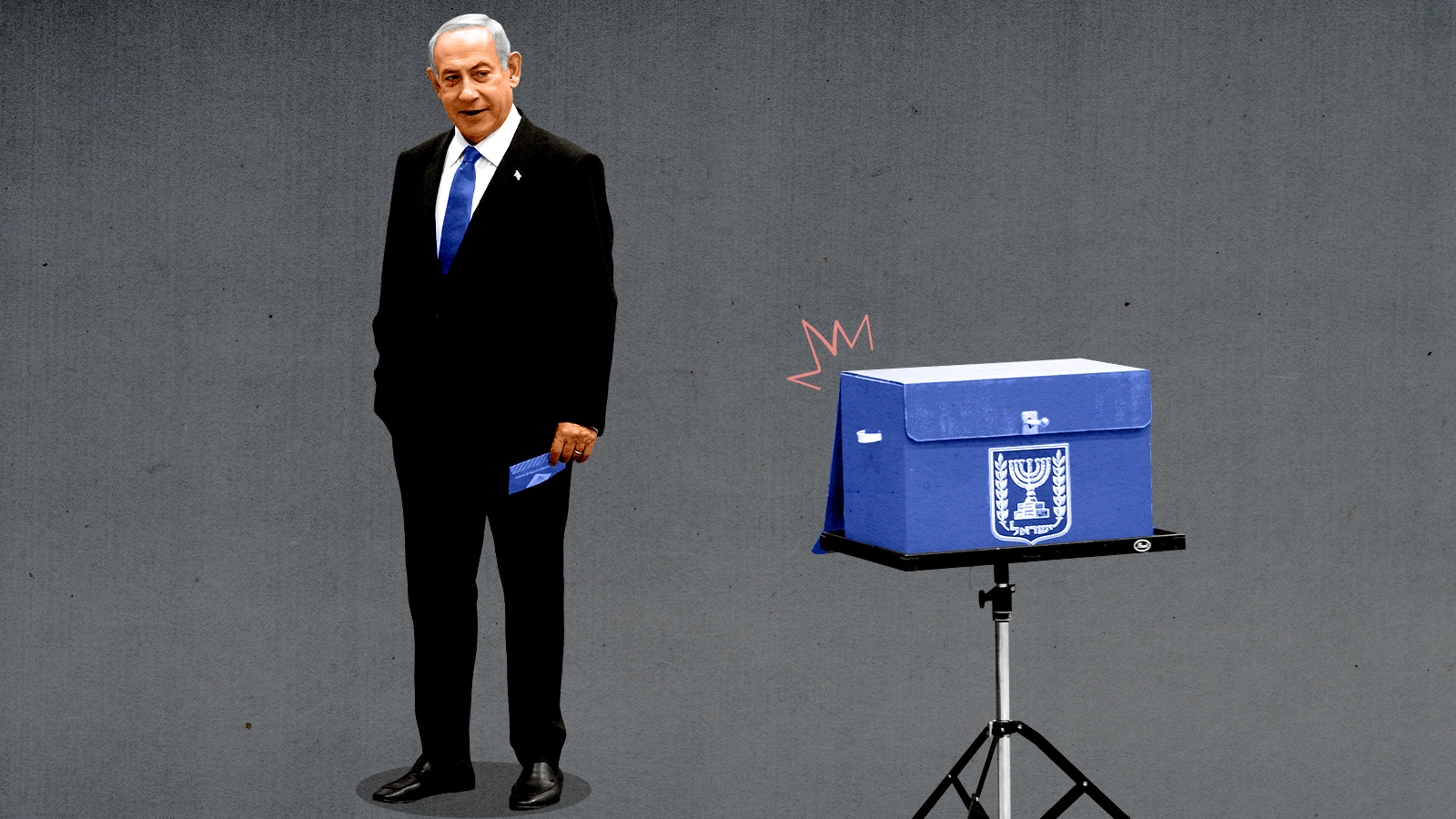The Israeli election and the far-right
Another country swings toward the fringe


A free daily email with the biggest news stories of the day – and the best features from TheWeek.com
You are now subscribed
Your newsletter sign-up was successful
On Tuesday, Israel voted in its fifth election in under four years to end the current political deadlock. Election officials say that the turnout was the highest since 2015. Voters chose between the right-wing bloc led by Netanyahu and the left-wing and centrist parties led by current Prime Minister Yair Lapid.
Netanyahu, who was not the incumbent for the first time in 13 years, secured a chance to become prime minister once again because his coalition garnered a majority of Parliamentary seats. Here's everything you need to know:
Why so many elections?
This is Israel's fifth election in four years. The turmoil largely comes from feuding parties within the Israeli Parliament, called the Knesset. There are several parties within the Knesset, none of which hold the majority, CNN reports. This leads them to form coalitions containing multiple parties to wrest control of a majority of the 61 seats.
The Week
Escape your echo chamber. Get the facts behind the news, plus analysis from multiple perspectives.

Sign up for The Week's Free Newsletters
From our morning news briefing to a weekly Good News Newsletter, get the best of The Week delivered directly to your inbox.
From our morning news briefing to a weekly Good News Newsletter, get the best of The Week delivered directly to your inbox.
The coalitions tend to be unstable and can shift and change easily, disrupting the majority in the Knesset. When this happens, the new majority tends to call a new election. The past few years have seen substantial shifts in coalitions, leading to many elections.
What's going on with Netanyahu?
The quantity of elections is also largely attributed to Netanyahu, who has left the country almost evenly divided. He was Israel's longest-serving prime minister but is now facing corruption charges, which he actively denies, Reuters reports. Despite this, the charges have made him a polarizing figure, and resulted in his opponents forming an unprecedented coalition last year and ousting him from power, CNN continues. However, the coalition only lasted a little over a year before its leaders — Lapid of the centrist Yesh Atid party and Naftali Bennett of the right-wing, now-splintered New Right — decided to call for a new election.
Despite being removed from power, Netanyahu eyed a comeback. Even during Election Day on Nov. 1, he was aggressively campaigning, going as far as to wake up one voter to send him to the polls. Political commentator Mazal Mualem called Netanyahu a "social and cultural phenomenon" and said that the fact "he has survived till now is proof of his power."
Netanyahu's bloc took a decisive victory grabbing 64 of the 120 Knesset seats, a clear majority, The Wall Street Journal reports. His bloc includes his party, Likud, which is now the largest party in Parliament with 32 seats, though it was boosted to power by welcoming far-right support.
A free daily email with the biggest news stories of the day – and the best features from TheWeek.com
In particular, Netanyahu joined forces with far-right lawmaker and leader of the Religious Zionism party Itamar Ben-Gvir. Ben-Gvir only just scraped into Parliament in 2021; however, his party has gained traction, writes The New York Times. Many of Netanyahu's more moderate allies abandoned him over his corruption charges, requiring him to court ultra-Orthodox Jewish parties, despite not being a member of the far-right himself.
What does the election mean for Israel?
While Netanyahu is almost definitely going to become prime minister again due to his bloc's impending majority in the Knesset, the biggest victory of the night was for the far-right, which became the third-largest party in the Parliament with 14 seats and the second-largest in Netanyahu's coalition, the Times explains.
While the far-right previously only had minor political influence, their success can perhaps drastically change the future of Israeli politics. Far-right leader Ben-Gvir has previously been convicted of inciting racism and supporting a terrorist organization ("Ben-Gvir was a follower of the late, explicitly racist, ultra-nationalist Meir Kahane, whose organization was banned in Israel and designated as a terrorist group by the United States," the BBC explains). He has also been vocal about ending Palestinian autonomy. In a speech on Wednesday, he said, "The time has come for us to be the landlords of our country."
The hope for opponents of Netanyahu and Ben-Gvir was for three parties — an Islamist party, a leftist party, and a Palestinian nationalist party — to garner enough votes in Parliament to block Netanyahu's appointment as prime minister, a hope that unfortunately didn't come to fruition. Arab representation in the Knesset has been greatly reduced and has left the 9 million Israeli Arabs terrified.
Netanyahu's return will also end Lapid's rather diverse government, including parties from the right and left as well as the first-ever independent Arab party to join a governing coalition. He might also make major judicial reforms to free himself from potential corruption and bribery charges, Reuters reports.
What does the election mean for the world?
The success of the far-right party in Israel's election is part of a broader global trend that includes Italy, Sweden, and, until the most recent election, Brazil. Israel's election also indicates a rise in nationalism in the nation, which concerns many Palestinians who are afraid the new leadership will incite violence in the region.
Lapid conceded to Netanyahu saying "I wish Netanyahu success, for the sake of the people of Israel and the State of Israel."
Update Nov. 3: This piece has been updated to reflect the latest election results.
Devika Rao has worked as a staff writer at The Week since 2022, covering science, the environment, climate and business. She previously worked as a policy associate for a nonprofit organization advocating for environmental action from a business perspective.
